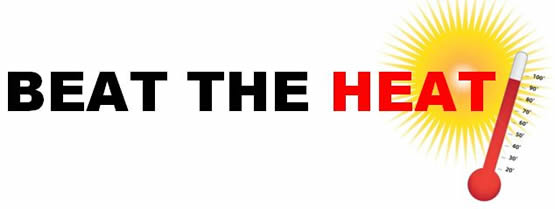Human Services
Heat Safety Information
Dallas County Health and Human Services - 2377 N. Stemmons Freeway, Dallas, TX 75207
Telephone: 214-819-2000
Summer in North Texas means sweltering temperatures and potentially unsafe conditions. Residents should be mindful of the potential health risks that can result from an increase in temperatures. The heat can cause heat cramps, heat exhaustion, heat stroke and even death. People 18 to 50 years old are most affected by heat-related illnesses in Dallas County. Remember, heat-related illnesses are preventable!
Prepare for Summer Heat
- Install window air conditioners snugly; insulate if necessary.
- Check air-conditioning ducts for proper insulation.
- Install temporary window reflectors (for use between windows and drapes), such as aluminum foil-covered cardboard, to reflect heat back outside.
- Weather-strip doors and sills to keep cool air in.
- Cover windows that receive morning or afternoon sun with drapes, shades, awnings, or louvers. (Outdoor awnings or louvers can reduce the heat that enters a home by up to 80 percent.)
- Keep storm windows up all year.
- Listen to local weather forecasts and stay aware of upcoming temperature changes.
- Know those in your neighborhood who are elderly, young, sick, or overweight. They are more likely to become victims of excessive heat and may need help.
- Be aware that people living in urban areas may be at greater risk from the effects of a prolonged heat wave than are people living in rural areas.
- Get trained in first aid to learn how to treat heat-related emergencies.
When It Gets Hot
- Listen to local weather forecasts or critical updates from the National Weather Service (NWS).
- Never leave children or pets alone in a closed vehicle.
- Stay indoors as much as possible and limit exposure to the sun.
- Consider spending the warmest part of the day in public buildings such as libraries, schools, movie theaters, shopping malls, and other community facilities. Circulating air can cool the body by increasing the perspiration rate of evaporation.
- Eat well-balanced, light, and regular meals. Avoid using salt tablets unless directed to do so by a physician.
- Drink plenty of water, even if you do not feel thirsty. Avoid drinks with caffeine. Persons who: have epilepsy or heart, kidney, or liver disease; are on fluid-restricted diets; or have a problem with fluid retention, should consult a doctor before increasing liquid intake.
- Dress in loose-fitting, lightweight, and light-colored clothes that cover as much skin as possible. Avoid dark colors because they absorb the sun's rays.
- Protect face and head by wearing a wide-brimmed hat.
- Avoid strenuous work during the warmest part of the day. Use a buddy system when working in extreme heat and take frequent breaks.
- Check on family, friends, and neighbors who do not have air conditioning and who spend much of their time alone.
- Avoid extreme temperature changes.
- Check on your animals frequently to ensure that they are not suffering from the heat.
- Go to a designated cooling center if your home loses power during periods of extreme heat.
Know the Terms
- Heat Wave - Prolonged period of excessive heat, often combined with excessive humidity.
- Heat Index - A number in degrees Fahrenheit (F) that tells how hot it feels when relative humidity is added to the air temperature. Exposure to full sunshine can increase the heat index by 15 degrees.
- Heat Cramps - Muscular pains and spasms due to heavy exertion. Although heat cramps are the least severe, they are often the first signal that the body is having trouble with the heat.
- Heat Exhaustion - Typically occurs when people exercise heavily or work in a hot, humid place where body fluids are lost through heavy sweating. Blood flow to the skin increases causing blood flow to decrease to the vital organs. This results in a form of mild shock. If not treated, the victim's condition will worsen. Body temperature will keep rising and the victim may suffer heat stroke.
- Heat Stroke / Sun Stroke - A life-threatening condition. The victim's temperature control system, which produces sweating to cool the body, stops working. The body temperature can rise so high that brain damage and death may result if the body is not cooled quickly.
- Excessive Heat Watch - Conditions are favorable for an excessive heat event to meet or exceed local Excessive Heat Warning criteria in the next 24 to 72 hours.
- Excessive Heat Warning - Heat Index values are forecasted to meet or exceed locally defined warning criteria for at least 2 days (daytime highs=105-110° Fahrenheit).
- Heat Advisory - Heat Index values are forecast to meet locally defined advisory criteria for 1 to 2 days (daytime highs=100-105° Fahrenheit).
Read the latest Heat-Related Illness Report for Dallas County:
Download educational flyers by clicking the links below:
QUICK LINKS
LOCATIONS
EMPLOYEES
-
You must be on the network to see these links.






